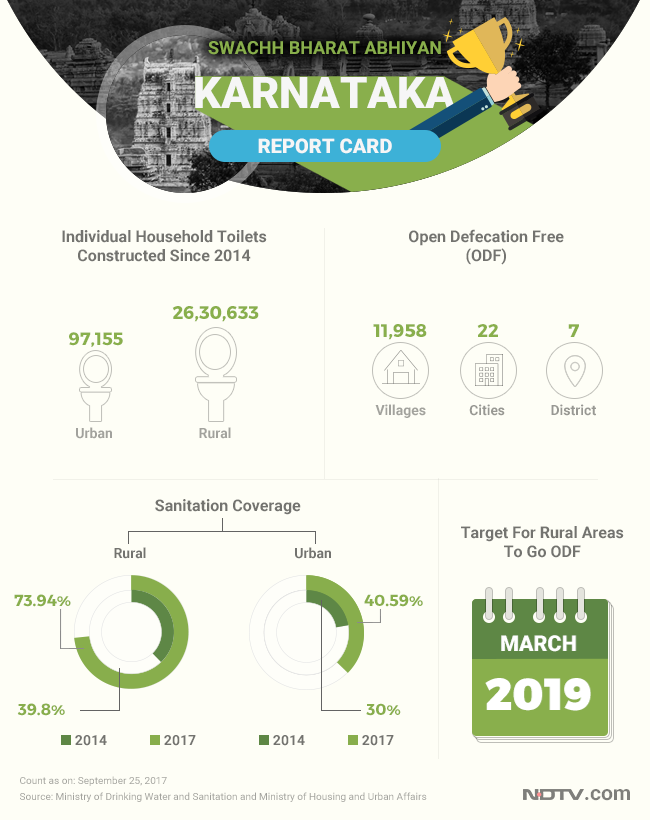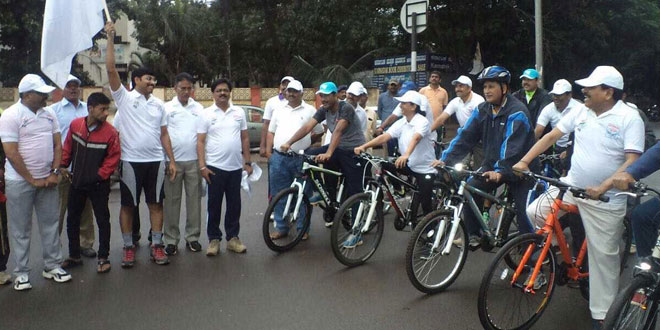Highlights
- Karnataka aims to eradicate open defecation by March 2019
- Rural areas have sanitation coverage of 73.94% whereas urban areas have 40%
- The state aims to make 10 more districts ODF by October 2
New Delhi: Sharanamma Bakar, a vegetable vendor and a self-proclaimed Swachh Bharat ‘Fan No 1’ from Koppal district in Karnataka is today famous for her efforts to spread the message of the cleanliness campaign. She goes door-to-door not to sell vegetables but instead to promote a simple message – ‘Toilet Is A Necessity, Here’s Why You Should Have One.’ Not just that, she also gives 1 kilo tomatoes for free to families that already have a toilet. Sharanamma is not alone, her district – Koppal is also well-known for its Swachh activities. On August 11, the district formed a spiral human chain of 10,000 people covering about 15 km area to celebrate ‘Freedom From Open Defecation’ week in a creative yet an educative manner. Moreover, the district set a record by building 20,000 toilets in 200 hours. Koppal needs to construct 48,000 more toilets to be declared as open defecation free and the district is aiming to build these by October 2, 2017 in order to get the tag of Open Defecation Free on the day of Rashtriya Swachhta Diwas.

Karnataka’s Koppal District forms Human Chain of 10,000 people to celebrate ‘Khule Mein Shauch Se Azaadi’ Week
Also Read: This Swachh Bharat Fan ‘No. 1’ In Karnataka Gives 1 Kg Tomato Free To Families With Toilets
The district is shining example of success of Swachh Bharat Abhiyan in Karnataka’s rural areas. From day one, the state has shown tremendous progress, from mere 39.8% of sanitation in 2014, it moved up to 73.94% in 2017. As of September 25, more than 26 lakh toilets (26,30,633) have been constructed – in 2014-2015 more than 7 lakh toilets (7,79,044), in 2015-2016 around 5 lakh toilets (5,30,917), in 2016-2017 around 7 lakh toilets (7,20,015) and in the ongoing current year so far, about 5 lakh toilets have been constructed.
Taking into account the progress made by the state, the Centre in this fiscal year has approved more funds – Rs 419.56 crore as opposed to Rs 190.07 crores in the previous fiscal year to Karnataka under the Swachh Bharat Abhiyan in order to speed up construction of toilets in rural areas.
In Numbers: Rural Areas Swachhta Report
Till now nearly 11 thousand villages out of about 29,406 villages and 7 districts out of 30 districts have been successful in eradicating open defecation completely. And the target is to declare the next 10 districts ODF by this Rashtriya Swachhta Diwas – October 2. The key to success has been focussing more on sustaining the swachh efforts than just construction of toilets.
Almost all the villages and districts are working together with one aim – to make the state ODF on priority. Block after block, village after village, Karnataka is moving towards an ‘open defecation free state’ mark.
Recently, the Belagavi District Panchayat celebrated its National Sports Day by conducting a ‘Swachh Cyclothon’ where a group of 120 people participated in the 13 kilometre event, simply to underline the irony of India – it has achieved several sports honours internationally, but, it is lagging behind in terms of sanitation. In the same district, Gulaab Gang is becoming extremely popular – they are going door-to-door and to convincing people to end open defecation and telling them the importance of using a toilet.
Also Read: Gulaab Gang Returns, This Time To Fight Against The Ugly Practice Of Open Defecation In Karnataka
The Swachh Story Of Urban Karnataka
On the Urban front, the sanitation coverage today is 40.59%, as opposed to 30% in 2014. Out of 277 urban local bodies, 19 have achieved the tag of ODF successfully. The target is to make Karnataka’s small and medium cities ODF by October 2, 2017.
As of September 25, in urban areas, approximately 97,155 individual toilets have been constructed whereas around 5,000 community toilets have been built. 22 cities have been successful in eliminating open defecation. And, the target to make another 100 urban local bodies (ULBs) ODF is set for December this year.
As per this year’s Swachh Survekshan, which assessed 434 cities across India on basis of cleanliness parameters, Karnataka’s cities performance were not up to the mark, Mysore was ranked fifth, down from its position of number one from last two years. Whereas Bengaluru ranked a poor 210, dropping from its last year rank of 38. The drop is drastic, considering that Mysore from last two years was known as the cleanest city of India whereas Bengaluru was the seventh cleanest city in 2015.
The cities of Karnataka have not been able to perform well both in sanitation and cleanliness front and are now taking adequate steps just like rural areas of the state to up its Swachh game.
The Government of Karnataka is committed to make areas falling under civic bodies of small and medium cities open defecation free by October 2018, confirmed Chief Minister Siddaramiah.
The Govt of Karnataka is committed to make areas falling under civic bodies of small and medium cities open defecation free by October 2018.
— CM of Karnataka (@CMofKarnataka) August 31, 2017
To eradicate open defecation from the state, it needs 3.8 lakh more toilets.
The state as in whole aims to go ODF by March 2019, further added Chief Minister Siddaramiah.






















































